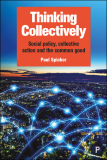Some accounts of the social changes taking place are highly optimistic about what they can mean for society. We won’t make the same mistakes again, the argument runs. We won’t pare public provision down to the bone. We won’t close down social protection. The response to the virus shows a sense of solidarity, of mutual responsibility, of common purpose.
 I wrote my book, Thinking collectively, about this kind of issue. The book runs through a series of arguments for community and collective action. But the starting point for that argument was a consideration of collectivism as a substantive reality. Everything we do is conditioned by our relationships with other people, and organisations and groups are fundamental to the way we live. Given that position, I’m not about to express surprise about the degree to which people have tried to help others in their community, or put themselves forward as public servants or volunteers – that’s exactly what we should expect. It’s basic to who we are, and what we are.
I wrote my book, Thinking collectively, about this kind of issue. The book runs through a series of arguments for community and collective action. But the starting point for that argument was a consideration of collectivism as a substantive reality. Everything we do is conditioned by our relationships with other people, and organisations and groups are fundamental to the way we live. Given that position, I’m not about to express surprise about the degree to which people have tried to help others in their community, or put themselves forward as public servants or volunteers – that’s exactly what we should expect. It’s basic to who we are, and what we are.
The current process of social distancing is a threat to the social fabric. It implies a degree of solitude, or isolation. It implies a degree of dissociation from other people. It depends on ‘atomisation’ – turning us into separate, distinctly individual units, centred on the household. That threatens our engagement with other people – how we do things, how we think about ourselves, and how we interact with other people. It would be nice to think that all this will lead to everyone wanting to do the opposite when the restrictions are lifted, but there’s little reason to suppose that will be the case. There are famous accounts of the atomisation of American society – David Riesman’s book, The lonely crowd, or Robert Putnam’s Bowling Alone. That was the world we were heading towards before this crisis happened. The problem with social distancing is, bluntly, that people may well get used to it. The longer it lasts, the more likely it is to accelerate the process of individualisation, putting us at a distance from everyone else. We should all be concerned.